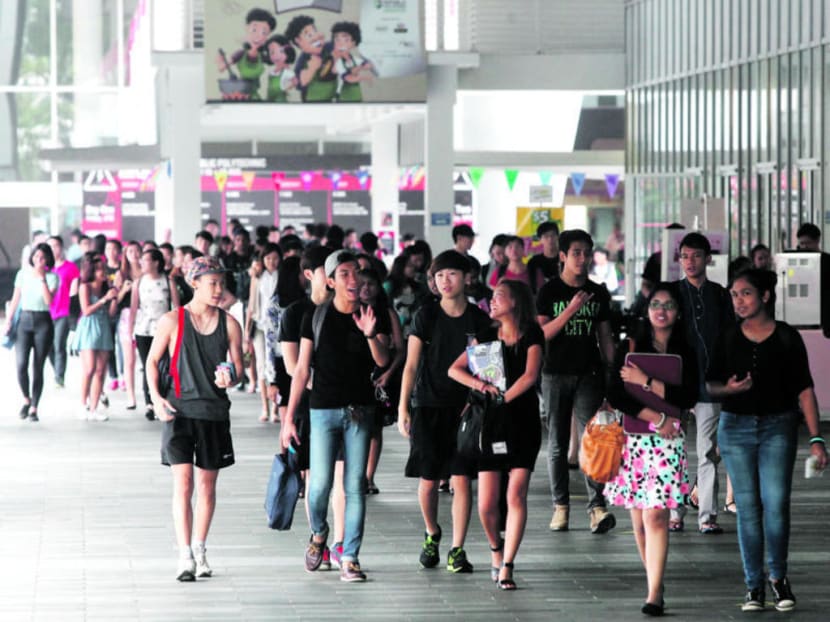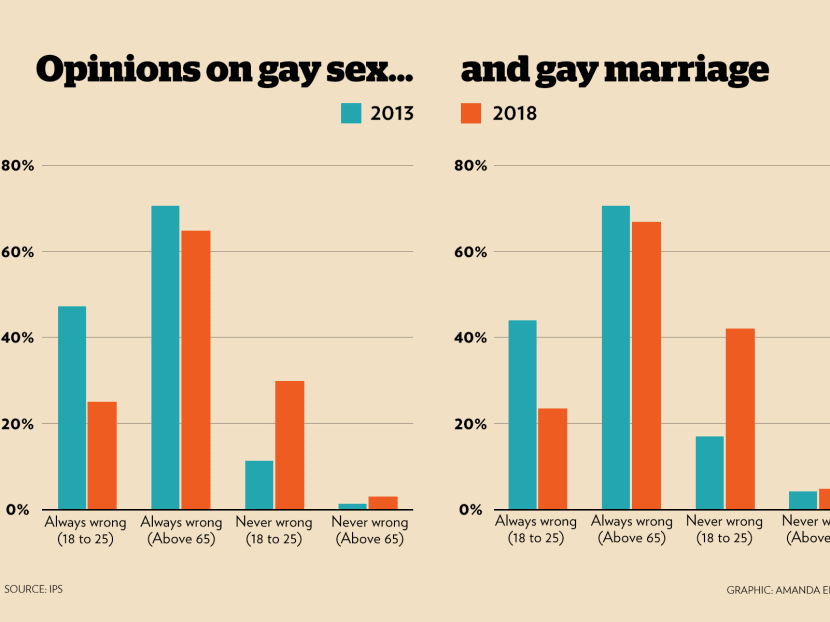S'poreans more liberal towards homosexuality compared with five years ago, IPS survey finds
SINGAPORE — Singaporeans have become more liberal towards homosexuality over the last five years, with a paper by the Institute of Policy Studies (IPS) showing “distinct shifts” in attitudes — especially among the young — towards gay sex and gay marriage.

The share of young Singaporeans who believe that gay sex is not wrong has nearly tripled in the last five years.
SINGAPORE — Singaporeans have become more liberal towards homosexuality over the last five years, with a paper by the Institute of Policy Studies (IPS) showing “distinct shifts” in attitudes — especially among the young — towards gay sex and gay marriage.
For instance, the paper revealed that 11.4 per cent of respondents to the latest survey, conducted in Singapore between August last year and January this year, felt sexual relations between two same-sex adults were not wrong at all. This was more than double the figure in 2013 (5.6 per cent).
Conversely, 50.4 per cent of Singaporeans in the latest survey said gay sex was always wrong, down from 61.6 per cent in 2013.
Singaporeans are also more welcoming of gay marriage now, with 16.4 per cent saying in the latest study that it was not wrong at all, compared with just 8.4 per cent in 2013.
And 48.5 per cent said gay marriage was always wrong, down from 58.8 per cent five years before.
Mr Leonard Lim, one of the paper’s authors, told TODAY that, while the survey results point to a growing acceptance of gay sex as well as other matters surrounding gay rights, most Singaporeans remain opposed to these issues.
“We cannot say for certain when the scales will be tipped in favour of gay rights in Singapore, but if present trends continue, it may not be very long before that takes place,” said Mr Lim, a research associate at IPS, a Singapore-based think-tank.
Notwithstanding the “thawing” attitudes towards homosexuality, Mr Lim and his co-authors, Dr Mathew Mathews and Ms Shanthini Selvarajan, said that there is continued strong opposition to infidelity and gambling.
More than six in 10 Singaporeans (63.4 per cent) said having sexual relations outside one’s marriage was always wrong, up slightly from 2013 (62.2 per cent).
On gambling, more than half (55.6 per cent) felt it was always wrong, compared with 53.8 per cent in 2013.
The paper analysed data from the second part of an IPS survey on race, religion and language.
The IPS canvassed views from 4,015 Singaporeans and permanent residents on issues spanning their racial and religious identity, as well as their attitudes towards social and political issues.
The paper drew comparisons between the latest survey findings and those of the first part, conducted in 2013.
ATTITUDES TOWARDS HOMOSEXUALITY: 2013 VS 2018
On the whole, resistance towards homosexuality, including gay sex and gay marriage, registered sharp falls between 2013 and 2018:
Sexual relations between two same-sex adults: In 2013, six in 10 respondents (61.6 per cent) felt that such behaviour was always wrong. Last year, that figure dropped to 50.4 per cent.
Gay marriage: In 2013, nearly six in 10 Singaporeans (58.8 per cent) felt gay marriage was always wrong, but last year, that figure fell to 48.5 per cent.
A gay couple adopting a child: In 2013, 45.9 per cent of Singaporeans felt that this was always wrong. This declined to 41.2 per cent last year. Meanwhile, the proportion of Singaporeans who felt that there was nothing wrong with a gay couple adopting a child rose from 13.2 per cent to 16.8 per cent in the same period.
YOUNGER S’POREANS MORE LIBERAL
The eroding opposition to homosexuality was more pronounced among younger Singaporeans than older respondents, the study found.

Gay sex: In 2013, nearly half of Singaporeans aged 18 to 25 (47.6 per cent) felt that this was always wrong.
In 2018, the figure was nearly halved (25.4 per cent).
By contrast, six in 10 Singaporeans above 65 (64.9 per cent) felt gay sex was always wrong.
At the other end, the proportion of 18-year-olds to 25-year-olds who felt that gay sex was not wrong at all nearly tripled from 11.6 per cent to 30.2 per cent between 2013 and 2018.
As for those above 65, just 3.2 per cent felt that gay sex was not wrong at all, edging up from 1.5 per cent in 2013.
Gay marriage: In 2013, four in 10 Singaporeans aged 18 to 25 (44.2 per cent) believed gay marriage was always wrong.
Five years later, just 23.9 per cent of young Singaporeans felt that way.
In fact, 42 per cent of those in this group said gay marriage was not wrong at all, more than doubling from 17.1 per cent in 2013.
In comparison, only 4.8 per cent of those above 65 felt that there was nothing wrong with gay marriage, up from 4.4 per cent in 2013.
BETTER-EDUCATED S’POREANS MORE LIBERAL
The survey found that those who were better-educated tended to hold more liberal views on homosexuality.
Gay sex: About a fifth (18.1 per cent) of those who held bachelor’s or master’s degrees said this was not wrong at all. In contrast, just 6.1 per cent of those who received an education at secondary level or below felt so.
Gay marriage: Similarly, 24.4 per cent of degree-holders felt gay marriage was not wrong at all, compared with 9.3 per cent of those who received secondary qualifications and below.
HOW ATTITUDES HAVE SHIFTED WITHIN COHORTS
To gauge how each cohort’s views have shifted in five years, the paper’s authors also compared the attitudes of those in each age group — say, between 20 and 24 in 2013 — and their attitudes in 2018, when they would be 25 to 29 years old.
Gay sex: In 2013, nearly a fifth (17.8 per cent) of 20-year-olds to 24-year-olds felt that gay sex was not wrong.
But in the latest study, over 40 per cent of this same cohort, now aged 25 to 29, felt this way.Gay marriage: Likewise, in 2013, 24.1 per cent of respondents aged 20 to 24 felt that gay marriage was not wrong. In 2018, the figure doubled to 49 per cent for the same cohort.
Older respondents did not register the same marked shift towards more liberal attitudes over the same period. On gay marriage, for instance, 11.4 per cent of 55-year-olds to 59-year-olds believed in 2013 that it was not wrong. Five years later, this figure climbed to 14.7 per cent among this cohort, who was 60 to 64 last year.
WHAT THE FINDINGS MEAN
Dr Mathews, Mr Lim and Ms Selvarajan said that while most of the respondents remained conservative towards gay marriage and sex, the findings pointed to “significant shifts in acceptance” towards these issues, especially among the young.
Their findings comparing the responses in age cohorts from 2013 to 2018 meant that there could be greater acceptance of gay rights in Singapore in future, if present trends continue, they said.
“This is because increasingly larger proportions of younger Singaporeans could view gay sex and gay marriage as not wrong, even as the older respondents are slower in accepting issues surrounding gay rights,” they said.
Youths, they noted, have given the most support to the growing acceptance of the needs of lesbian, gay, bisexual, transgender and queer individuals.
This could possibly be because of increased activism among millennials especially when it comes to human rights and gay rights, for instance.
The authors noted that the Government has on a few occasions said that it would consider the majority’s views on issues such as the repeal of Section 377A of the Penal Code, which criminalises sex between men.
“While the majority of Singaporeans remain conservative towards gay rights, if the trend towards more liberal attitudes among the young continues, certain social policies will have to inevitably be relooked and re-evaluated,” they added.
Mr Lim said that the changing attitudes indicated the need for continued regular large-scale surveys to discern sentiments on these issues and track evolving trends that can inform policymaking.








